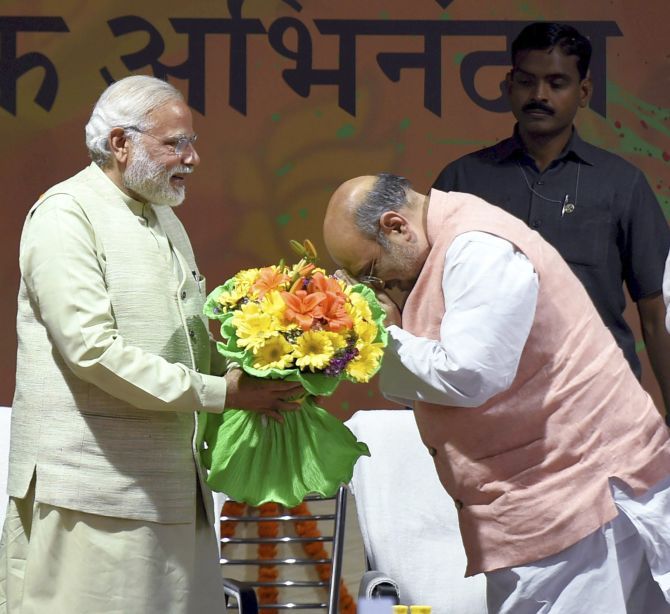'The coronation of Yogi Adityanath as the surprise chief minister should set at rest all speculation over the nature of the UP mandate,' says Saisuresh Sivaswamy.

It's taken the Bharatiya Janata Party one full week to decide on who will lead its government in the politically crucial state of Uttar Pradesh, a state it knew all along that it will win despite the naysayers' dire predictions.
In this time it had no difficulty in finding suitable names in states where it ended up as runner-up, but where it managed to squeak into office.
In this time, too, there had immense debate and discussion about the nature of the mandate from India's largest state which, after a significant hiatus has regained its position as the polestar of political fortunes.
Was it a case of Hindu consolidation?
Or was it a mandate for vikas/development?
As always, there were compelling arguments for both sides, but Saturday's coronation of Yogi Adityanath as the surprise chief minister by the BJP legislature party should set at rest all speculation over the nature of the mandate.
Union Minister M Venkaiah Naidu told the media that the yogi, the young, saffron-clad head of the Gorakhnath mutt, had asked that he be given two deputies to cope with the challenging task, and hence, after discussions with party chief Amit Shah, it was decided that UP will have two deputy chief ministers in Keshav Prasad Maurya, the MP from Phulpur, and Dinesh Sharma, Lucknow's mayor.
One need to look no further than this triumvirate that will take oath on Sunday afternoon to know the real state of the electoral mandate that favoured the BJP.
Maurya, a Khushwaha, is the OBC face of the party that saw a surge of non-Yadavs thronging to the party in the recent elections, pushing it to an unassailable position.
And Sharma, a Brahmin, reflects the party's traditional voter-base.
There, you have it. The forward castes and the OBCs, helmed by a saffron-clad politician.
Can there be a more in-your-face acknowledgement of how the UP mandate came about than this trio?
Prime Minister Narendra Modi and BJP chief Amit Shah have, since their chemistry led to the BJP's historic mandate of 2014, have been known to pull rabbits out of chief ministerial hats in the state elections the party has won in the last three years.
Be it installing a Brahmin, Devendra Fadnavis, in Maharashtra, a Maratha-dominated state; or the unexpected ML Khattar in Haryana, the choice they made were not along predictable lines.
This, and the week-long deliberation over who to appoint as CM in UP where one would have thought the decision would have been made weeks ago, were clear indications that the choice in Lucknow will be equally, if not more, surprising.
But the purpose behind Modi-Shah's decision is not to spring a surprise on the nation or to troll the media.
The duo's single-point agenda is to win elections, retain the mandate for their ideology, and to expand their organisation's footprint.
Every decision they make, rightly or wrongly, is solely motivated by this consideration.
Which is where other parties are found lacking. While most of them have a narrow focus, usually on the ruling family/dynasty that controls their levers of power, both Modi and Shah have no family to push to the forefront or maintain their hegemony.
For them it is not about family, but their Parivar.
See it through the prism of Sangh Parivar politics, and the out-of-the-box decision in Lucknow makes sense.
The message from UP, never mind the spin Naidu put on it, is about Hindu consolidation.
In his Saturday evening address to the media, Naidu was right about one aspect, however. It was when he called it a 'watershed moment in the BJP's history.'
He was absolutely bang on.
For the first time ever, the BJP will assume office in Lucknow as the undisputed leader in the entire state, its government helmed by a man who has never hidden his brand of politics, and who can be expected to continue doing the same while in office.
On Sunday he will be administered the oath of office by the state governor, Ram Naik, a veteran leader from the Rashtriya Swayamsevak Sangh Parivar.
The prime minister himself wears similar stripes, as does the BJP president.
And it doesn't take a clairvoyant to see that the BJP's nominee for President in July will wear the same colours.
Thus, when the BJP heads into the assembly election in Gujarat, a state where its electoral chances seemed bleak just a few months ago, the wheel will have come full circle.
It was from here that the BJP embarked on its experiment of mixing muscular Hindutva with development which, in just 12 years, helped its chief exponent catapult from a regional leader to a national one.
The heady cocktail has failed to give the party an electoral high only once in the last three years, in Bihar, but by the time the next round of elections come about in the state you can be sure Modi and Shah will have worked out a solution to that as well.
The BJP's dominance of India, its tools of power, is near absolute.
The executive is under its control; Parliament is almost so, it is only a question of time before the Upper House comes under it.
And the media, at least the parts of it that considers itself 'independent', have been rendered ineffective and toothless thanks to the adroit use of social media.
Can anything be more 'watershed than this moment, then?
IMAGE: BJP President Amit Shah greets PM Modi at the victory rally, March 12, 2017. Photograph: Kamal Singh/PTI Photo










